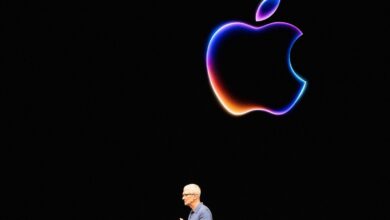Aunrée Houston discusses generative AI as Quest symposium keynote speaker – The Oswegonian

“People are too horrible,” Aunrée Houston, keynote speaker for the 2024 Quest symposium, uttered. “Oh my god.”
Houston intended to demonstrate the abuse of artificial intelligence by playing a YouTube video titled “AI Gone WRONG.” The video showed a montage of crude AI-generated movie posters for fake Disney and Pixar films. Many of the images are derived from edgy corners of TikTok and 4chan.
Houston, a graduate from 2000, spoke on what he called “the AI Renaissance” and how he sees it unfold in his position as vice president of account services and production operations for Paramount Global.
“In the AI Renaissance we are co-creators with machines,” Houston said. “We are crafting a future where human potential is amplified by AI.”
The controversy over generative AI erupted during last year’s Writers Guild of America strike, in part in response to production companies relying on AI-generated content in what the union said undermined writers’ credits. The strike ended with a tentative agreement requiring companies to disclose to writers if material given to them was in part AI-generated.
However, the use of AI has not been limited to generating content. By automating tedious steps in content design and creation, Houston said, AI could make content creation more efficient.
Inputting info from a diverse array of experiences into the AI data pool could enhance its output and prevent it from repeating biases and stereotypes, he added.
Houston’s presentation impressed audience members Margaret Spillett and Jennifer Broderick, who work for the university alumni magazine.
“For me, it was the idea that we have to share our stories to make AI more intelligent, more diverse, more accurate, more inclusive,” Spillett, editor of the magazine, said. “That was something I didn’t think about.”
Broderick, a graphic designer for the magazine, took notes during Houston’s speech on what AI tools she could incorporate into her work. She was optimistic about how humanity can rectify the abuse people can commit with AI tools.
“When [Houston] said ‘hydrating,’ there’s people that are hydrating it negative things,” Broderick said. “You’ve got to hydrate it with the positive so it balances out.”
To them, Houston being an alumnus provided students with valuable advice.
But Houston’s message did not brighten everyone’s opinion of the potential of AI.
“I like my job and I don’t want to be replaced by a computer,” Spillet said. “It makes me nervous; it’s a slippery slope…at what point can I teach it enough that it can do my job for me? Hopefully not until after I retire.”
Kati Rose, a biology major, enjoyed Houston’s speech, but still harbored distrust toward AI. Her professors effectively banned its use from their classrooms, a sentiment Rose agreed with.
“My experience as a Black woman, as a Caribbean woman, cannot be replicated through AI,” Darby Faublas, a 2022 graduate, told Houston at a question-and-answer segment. “I don’t think, no matter how much information you put into it, I don’t think that the true experience of a human being can ever truly be replicated within the system.”
Several audience members applauded Faublas’ response to Houston. Even Houston beckoned for a second applause after Faublas elaborated that she considered AI art to not be art at all, since it “comes without a soul.”
But Houston defended his position that adding diversity to AI programs’ data pools could resolve issues of representation in media.
“There is so little different experiences that are diverse that are available currently,” Houston said. “If you do a Google search right now, a lot of times you won’t find enough information that’s representative of different folks.”
Houston clarified that he did not have all the answers when it came to AI, but he wanted to get people to ask the right questions.
“I’m not an expert, but I love a conversation,” Houston said.
Additional contributions from Matthew Rivenburgh.
Photo by Matthew Rivenburgh



